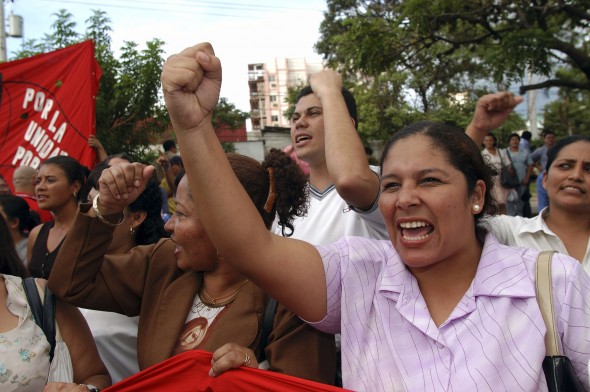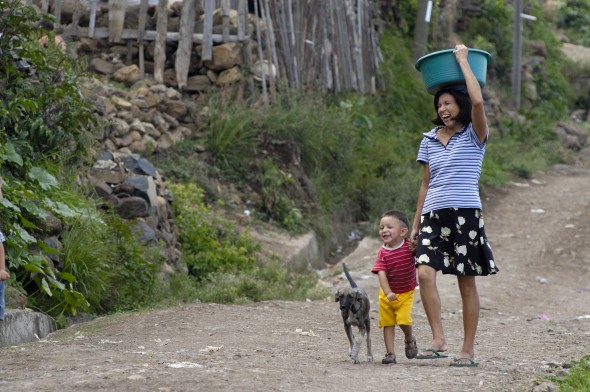Global Lens Reflections on life, the universe, and everything
Honduras: Coup +1
Today marks the one-year anniversary of the coup in Honduras that ousted President Mel Zelaya. It’s been a tortuous year for Hondurans, as well as for U.S. citizens who hoped that the Obama administration was really going to change course after decades of doing the wrong thing in Latin America. Yet the right thing as been elusive, as a report from the Latin America Working Group noted last month. There have been small steps, like stepping back one baby step after another from decades of idiotic policy towards Cuba (I caught the Oakland concert by Silvio Rodriguez on June 12 – it was magical), and there have been good words, as when President Obama spoke these words in Trinidad last year:
I know that promises of partnership have gone unfulfilled in the past, and that trust has to be earned over time. While the United States has done much to promote peace and prosperity in the hemisphere, we have at times been disengaged, and at times we sought to dictate our terms. But I pledge to you that we seek an equal partnership. There is no senior partner and junior partner in our relations; there is simply engagement based on mutual respect and common interests and shared values. So I’m here to launch a new chapter of engagement that will be sustained throughout my administration.
We’re still waiting, Mr. President.
One of the places where Obama’s response drew mixed reviews was Honduras, where the administration seemed confused about how to respond. Torn between regional friends, like Brazil, which wanted an assertive response to the break in democratic order, and the associates of Hillary Clinton, like Lanny Davis, who lobbied for the U.S. to back the golpistas and repeat the myth that Zelaya was turning Honduras into some sort of Venezuelan satellite, Obama vacillated, and his inaction ultimately weakened the nonetheless surprisingly forceful OAS response. Simply put, U.S. policy supported the military coup and the repression that followed.
As a result, heavy-handed repression reigns today in Honduras, as demonstrated by the characterization of Honduras as the most dangerous place in the world for journalists. Not the Phillipines, not Iraq. Honduras. So far this year, eight journalists have been killed there.
I lived in Honduras for over eight years, and was always in awe of the courage of my Honduran colleagues. People like Ismael Moreno, a Jesuit who runs Radio Progreso in the country’s north. Shut down by soldiers immediatly after the coup, Radio Progreso fought to come back on the air and has been fearlessly doing its job despite violent assaults and death threats.
Thelma Mejia is a Honduran journalist who has for years written for the Inter Press Service. When I moved to Honduras in 1994, to acquaint me with the country I read every IPS story of hers for the previous several years. It took a while, but gave me a good understanding of how and why things happened there. I sought her out and we became friends. Whenever I needed to know who to talk to about a particular topic, Thelma always knew. She has faced death threats and other incredible pressures for fearlessly reporting on things like government corruption after Hurricane Mitch. We collaborated a few times, such as when I learned that a former CIA agent was going to help a wealthy U.S. businessman convicted of sex trafficking escape from prison. Thelma and I worked different angles of the story, and we published our story–without bylines–in the daily El Heraldo the day before the planned escape. They called it off, and the former CIA guy, who was running the operation from a suite in Tegucigalpa’s fanciest hotel, was furious with me, though I feigned ignorance. The guy ended up escaping a year later, and I ran into the former CIA guy a few days later at a horse-riding stable where my daughter was taking lessons. I congratulated him on the successful escape of his friend, and he smiled coyly and said, “I don’t have the faintest idea what you’re talking about.” The escapee is still on the lam.
Over the years Thelma has documented how Honduras has crept back from its years as a U.S. military pawn in the 1980s, abandoning the death squads in favor of demilitarization and democracy. Yet all that changed with the coup. In a one-year story on the IPS wire, she describes how the country’s corrupt and powerful military today exercises inordinate power, effectively blocking any political or electoral reform. As an example, she tells how the head of the country’s electoral system suggested ending the military’s role as the transporter of ballot boxes during elections. Within days, after being called on the carpet by senior military officials, he changed his mind.

